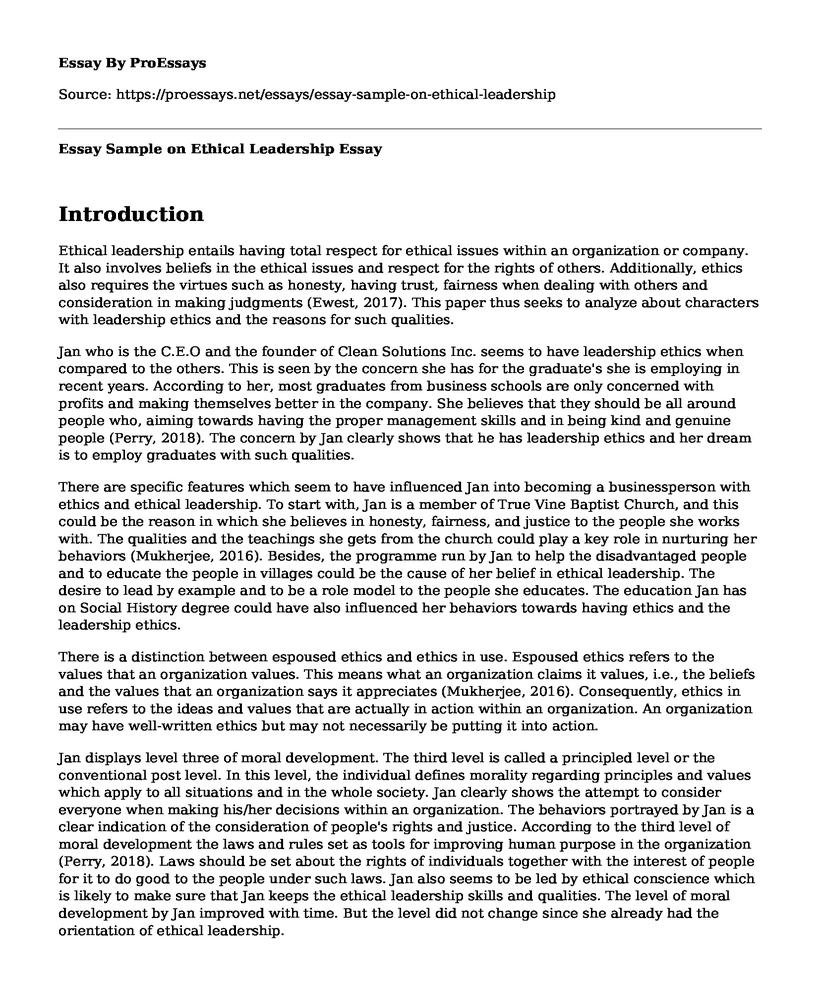Introduction
Ethical leadership entails having total respect for ethical issues within an organization or company. It also involves beliefs in the ethical issues and respect for the rights of others. Additionally, ethics also requires the virtues such as honesty, having trust, fairness when dealing with others and consideration in making judgments (Ewest, 2017). This paper thus seeks to analyze about characters with leadership ethics and the reasons for such qualities.
Jan who is the C.E.O and the founder of Clean Solutions Inc. seems to have leadership ethics when compared to the others. This is seen by the concern she has for the graduate's she is employing in recent years. According to her, most graduates from business schools are only concerned with profits and making themselves better in the company. She believes that they should be all around people who, aiming towards having the proper management skills and in being kind and genuine people (Perry, 2018). The concern by Jan clearly shows that he has leadership ethics and her dream is to employ graduates with such qualities.
There are specific features which seem to have influenced Jan into becoming a businessperson with ethics and ethical leadership. To start with, Jan is a member of True Vine Baptist Church, and this could be the reason in which she believes in honesty, fairness, and justice to the people she works with. The qualities and the teachings she gets from the church could play a key role in nurturing her behaviors (Mukherjee, 2016). Besides, the programme run by Jan to help the disadvantaged people and to educate the people in villages could be the cause of her belief in ethical leadership. The desire to lead by example and to be a role model to the people she educates. The education Jan has on Social History degree could have also influenced her behaviors towards having ethics and the leadership ethics.
There is a distinction between espoused ethics and ethics in use. Espoused ethics refers to the values that an organization values. This means what an organization claims it values, i.e., the beliefs and the values that an organization says it appreciates (Mukherjee, 2016). Consequently, ethics in use refers to the ideas and values that are actually in action within an organization. An organization may have well-written ethics but may not necessarily be putting it into action.
Jan displays level three of moral development. The third level is called a principled level or the conventional post level. In this level, the individual defines morality regarding principles and values which apply to all situations and in the whole society. Jan clearly shows the attempt to consider everyone when making his/her decisions within an organization. The behaviors portrayed by Jan is a clear indication of the consideration of people's rights and justice. According to the third level of moral development the laws and rules set as tools for improving human purpose in the organization (Perry, 2018). Laws should be set about the rights of individuals together with the interest of people for it to do good to the people under such laws. Jan also seems to be led by ethical conscience which is likely to make sure that Jan keeps the ethical leadership skills and qualities. The level of moral development by Jan improved with time. But the level did not change since she already had the orientation of ethical leadership.
Conclusion
The moral development influences the choices of a leader that he/she has. It should be in the curriculum of business schools to educate the students about the importance of business ethics. Companies should organize seminars to inform the employees of the need for leadership ethics. Moral development should also be emphasized in schools and the workplace since it plays a crucial role in the social interaction. Companies and business schools should work towards developing moral reasoning to the employees and the students.
References
Ewest, T. (2017). The challenges within ethical leadership theories. Prosocial Leadership, 23-42. doi:10.1057/978-1-137-57808-2_2
Mukherjee, S. (2016). Alternative learning: A voyage for future leadership. Ethical Leadership, 297-310. doi:10.1057/978-1-137-60194-0_17
Perry, A. (2018). Ethics, leadership, and ethical leadership. Biblical Theology for Ethical Leadership, 23-43. doi:10.1007/978-3-319-75043-9_2
Cite this page
Essay Sample on Ethical Leadership. (2022, Jul 21). Retrieved from https://proessays.net/essays/essay-sample-on-ethical-leadership
If you are the original author of this essay and no longer wish to have it published on the ProEssays website, please click below to request its removal:
- Research Paper on Social and Organizational Issues in Healthcare
- Quantum Leadership: Building Better Partnerships Essay
- Essay Sample on Strategic Management
- Research Paper on Management and Leadership Theories
- Essay Example on Social Media's Impact on Politics: Making Leaders More Accessible
- Leadership Philosophy and Attributes - Paper Example
- Implementing Policy in the Health Care System







